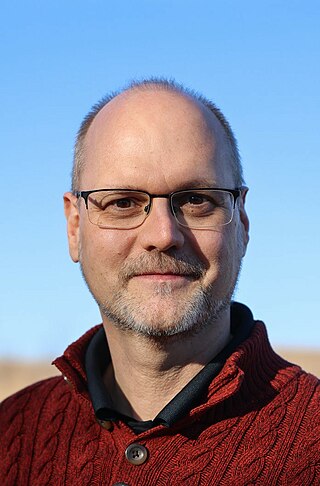Natural language understanding (NLU) or natural language interpretation (NLI) is a subset of natural language processing in artificial intelligence that deals with machine reading comprehension. NLU has been considered an AI-hard problem.
In information science, formal concept analysis (FCA) is a principled way of deriving a concept hierarchy or formal ontology from a collection of objects and their properties. Each concept in the hierarchy represents the objects sharing some set of properties; and each sub-concept in the hierarchy represents a subset of the objects in the concepts above it. The term was introduced by Rudolf Wille in 1981, and builds on the mathematical theory of lattices and ordered sets that was developed by Garrett Birkhoff and others in the 1930s.

An entity–relationship model describes interrelated things of interest in a specific domain of knowledge. A basic ER model is composed of entity types and specifies relationships that can exist between entities.
Datalog is a declarative logic programming language. While it is syntactically a subset of Prolog, Datalog generally uses a bottom-up rather than top-down evaluation model. This difference yields significantly different behavior and properties from Prolog. It is often used as a query language for deductive databases. Datalog has been applied to problems in data integration, networking, program analysis, and more.

In sociology, social complexity is a conceptual framework used in the analysis of society. In the sciences, contemporary definitions of complexity are found in systems theory, wherein the phenomenon being studied has many parts and many possible arrangements of the parts; simultaneously, what is complex and what is simple are relative and change in time.
Peter Pin-Shan Chen is a Taiwanese-American computer scientist. He is a (retired) distinguished career scientist and faculty member at Carnegie Mellon University and Distinguished Chair Professor Emeritus at LSU. He is known for the development of the entity–relationship model in 1976.
In computer science, an abstract state machine (ASM) is a state machine operating on states that are arbitrary data structures.

Egon Börger is a German-born computer scientist based in Italy.
DOGMA, short for Developing Ontology-Grounded Methods and Applications, is the name of research project in progress at Vrije Universiteit Brussel's STARLab, Semantics Technology and Applications Research Laboratory. It is an internally funded project, concerned with the more general aspects of extracting, storing, representing and browsing information.
John Krogstie is a Norwegian computer scientist, professor in information systems at the Norwegian University of Science and Technology (NTNU) in Trondheim, Norway, and an expert in the field of enterprise modelling.
Colette Rolland is a French computer scientist and Professor of Computer Science in the department of Mathematics and Informatics at the University of Paris 1 Pantheon-Sorbonne. She is a leading researcher in the area of information and knowledge systems, known for her work on meta-modeling, particularly goal modelling and situational method engineering.
The triune continuum paradigm is a paradigm for general system modeling published in 2002. The paradigm allows for building of rigorous conceptual frameworks employed for systems modeling in various application contexts.
The ER – International Conference on Conceptual Modeling is an annual research conference computer science dedicated to information and conceptual modeling. Since the first event in 1979 in Los Angeles, California, USA, the conference has evolved into one of the major forums for research on conceptual modeling and information retrieval.

Eckhard D. Falkenberg is a German scientist and Professor Emeritus of Information Systems at the Radboud University Nijmegen. He is known for his contributions in the fields of information modelling, especially object-role modeling, and the conceptual foundations of information systems.
Bernhard Steffen is a German computer scientist and professor at the TU Dortmund University, Germany. His research focuses on various facets of formal methods ranging from program analysis and verification, to workflow synthesis, to test-based modeling, and machine learning.
Hans-Jörg Kreowski is a professor for computer science at the University of Bremen in North West Germany. His primary research area is theoretical computer science with an emphasis on graph transformation, algebraic specification, and syntactic picture processing. He is also a member of the Forum of Computer Scientists for Peace and Social Responsibility (FIfF).
John Mylopoulos is a Greek-Canadian computer scientist, Professor at the University of Toronto, Canada, and at the University of Trento, Italy. He is known for his work in the field of conceptual modeling, specifically the development an agent-oriented software development methodology. called TROPOS.
Klaus Pohl is a German computer scientist and Professor for Software Systems Engineering at the University of Duisburg-Essen, mainly known for his work in Requirements Engineering and Software product line engineering.

Klaus Tochtermann is a professor in the Institute for Computer Science at Kiel University and also the director of the ZBW – German National Library of Economics – Leibniz Information Centre for Economics.

Pascal Hitzler is a German American computer scientist specializing in Semantic Web and Artificial Intelligence. He is endowed Lloyd T. Smith Creativity in Engineering Chair, one of the Directors of the Institute for Digital Agriculture and Advanced Analytics (ID3A) and Director of the Center for Artificial Intelligence and Data Science (CAIDS) at Kansas State University, and the founding Editor-in-Chief of the Semantic Web journal and the IOS Press book series Studies on the Semantic Web.






